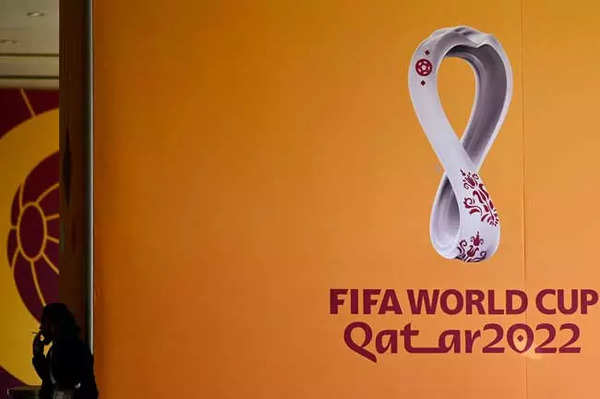FIFA World Cup 2022: Vacant spaces, Indian bulwark and Diego Maradona’s permanent absence | Football News

It was lost on her, or not, but it got you thinking. Who exactly was coming to whom at this World Cup? Was it the rulers of world football who pushed every button, turned every dial, bent every self-set rule to ensure that this mammoth money-spinning four-yearly global festival came to this tiny desert nation, essentially a one-city country (smaller than football-mad Goa by some estimates)? Or were the overtures from the other side, the initial prodding to engage, all of it finally meeting midway in highly lucrative convenience.
Whatever the truth of this worst-kept secret of current-day world sport and geopolitics, the appointed hour is here.
Two days left before the ball will finally roll but for many, the Qatar World Cup has already been active on social media, raging particularly on Twitter where the outraged critics pointed out, not without reason or agenda for most part, against the dodgy human rights record of the Gulf state, and the spin merchants who went about putting out fires.
Early Friday’s news of some of Twitter’s services down and fears and speculation of a shutdown, till at least Monday, amidst mass employee resignations, in large part due to the confusion following the Musk takeover, should put a large wet towel of dismay on the proceedings. Because at some level, any trend on Twitter was good enough to keep the recall going, it had been doing just that all these months.

AFP Photo
Will the outage really push the World Cup in the recesses of the mind, for the opening weekend at least, how adversely it will affect the social media cells of the Qatar mission, we still don’t know. But what is evident that, two days to go, you cannot escape an underwhelming idea that assails you once you land and the asphalt dust of fresh construction – and there are clusters and clusters of it — hits your nose, sticks to your shoes and enters your senses to become the signature essence of this journey.
Qatar continues its current-day life with a vacant approach to it, even if well-oiled and manicured. But on the ground, or just beneath, there’s another buzz, the kind you must stop, listen to discern, the hum that comes with processes under work, deadlines under the thumb. And it’s being all held up silently by the migrant worker from India – from basic blue collar to high-end IT support.
Before the English language became de-rigueur for global jamborees and the invention of Google Translate, that crazily effective utility that makes talking to anybody such an ease, World Cups were invariably Towers of Babel, myriad tongues speaking all at once, arriving only in the universal language of football. Here at Qatar, without them as much as announcing it, the unofficial language of this World Cup is Indian – Hindi or Malayalam – inadvertently making the tournament and its accompanying emotion, the World Cup of the Indian working class. Even if displaced, they are seeking their own identity in it. “Yes, for the Mallus here, this could well have been a World Cup hosted in Kerala,” nodded Sandeep, a Thiruvananthapuram-origin radio jockey based in Doha and volunteering at the World Cup, “In every sense, it is ours.”
Maybe then, it was that invisible Indian bulwark that ensured arrival and exit at the gigantic, sleek but empty Hamad Airport was, to use the frequent flier’s cliché, a breeze. Those famous World Cup lines, the weaving rows to the immigration windows helping separate passengers, who are already unified with their flags draped over their luggage, Sombreros and neck pillows hanging together from bags, fighting off sleep but alert to the expectation of the game, are still waiting for them to arrive. “Is this a World Cup? Really? Then where is everybody,” chuckled a Bangladeshi Uber driver who raced his SUV through the wide but empty roads of his adopted homeland.
Compare this to the start of the 2010 World Cup in South Africa, another newbie footballing port but dissimilar in vision to Qatar in all imaginable, well-meaning ways possible. Landing at Jo’burg’s Oliver Tambo airport, with its everyday, ‘lived-in’ smell and feel, 12 years ago, you were instantly taken in by the hoarse, almost abrasive, somewhat persecuted football chant of the Argentinian fan that greeted you the moment you exited the terminal. The World Cup was still a few days away, yet huge Albiceleste banners hung from the arrival lounge railings, easily obscuring those of the many official sponsors who had paid a bomb to be displayed along the elite of the FIFA and World Cup marketing blitz, and the Argentinians were calling out, as if since time eternity, to something in the distance. It was both unsettling and delightful at the same time, drawing you in for all time.

AP Photo
Of course, there was another appeal, almost fervent, to all that passion, that today lies buried. Diego Maradona, as coach of Argentina, was leading them to South Africa. There was a young, already-established, still-yet-to-explode Leo Messi in the ranks but the world came to see Maradona at his familiar, favourite stomping ground once again. So what if he had a rosary in his hand, an uncertain frown on his face, his battered, abused, podgy body in an ill-fitting suit, this was the World Cup and he was here again.
This time, there is no Maradona. November 25, three days after Argentina’s opening game against Saudi Arabia, will be his second death anniversary, making the Qatar World Cup the first in over four decades without Maradona — without doubt football’s most enduring debate: evil or angel, mad or genius, great or greatest – either in the mainframe or even on the periphery.
For this catharsis alone, and the dream to finally be able lay him to rest, by his long-time heir apparent, makes the Qatar World Cup a must-visit. So, what if no one has arrived yet, or the lines are only just beginning to swell at Hamad, or there’s a migrant worker from the Indian subcontinent squinting into the sun, still trying to figure where he missed that turn that led to the economic oasis he was promised.




